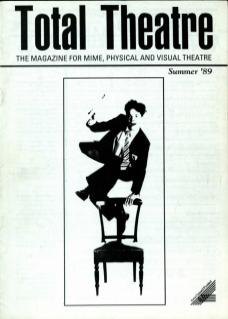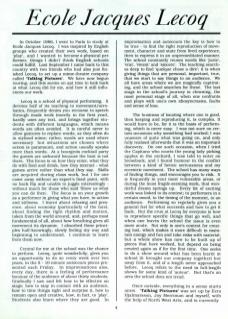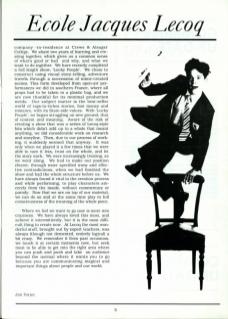In October 1986, I went to Paris to study at Ecole Jacques Lecoq. I was inspired by English groups who created their own work, based on ‘play’, and I wanted to become a physical performer, things I didn’t think English schools could fulfil. Last September I came back to this country with two friends who had also just finished Lecoq, to set up a mime-theatre company called Talking Pictures. We have now begun touring, and this seems an apt time to look back at what Lecoq did for me, and how it still influences our work.
Lecoq is a school of physical performing. It devotes half of its teaching to movement/acrobatics, frequently denies you recourse to speech through mask work (mostly in the first year), hardly uses any text, and brings together students with different languages, which means words are often avoided. It is careful never to allow gestures to replace words, as they often do in stylised mime: rather, words are used where necessary but situations are chosen where action is paramount, and action usually speaks more than words. At a bourgeois cocktail party the guests are awkward because the host is not there. The focus is on how they enter, what they do with food and drink, how they interact – what games arrive rather than what they say. Skills are acquired during class work, but I for one came away without an expert’s fixed point, with no back flip and unable to juggle interestingly – without much for those who said ‘Show us what you can do then’. The focus is on your growth as a performer in giving what you have, in action and stillness. I learnt about relaxing and presence, about economy (particularly of the face), about finding the right rhythm and motion, taken from the world around, and, perhaps most fundamental of all, about how breathing gives all movement its dynamic. I absorbed these principles half-knowingly, slowly feeling my way and beginning to understand. I continue to learn from them now.
Central for me at the school was the chance to perform. Lecoq, quite wonderfully, gives you an opportunity to do so every week over two years, in the 5-10 minute autocours pieces presented each Friday. In improvisations also, every day, there is a feeling of performance because of the audience of about thirty students. Gradually I saw and felt how to be effective on stage; how to stay in contact with an audience, how to time things right and surprise it, how to remain open and creative, how, in fact, to ‘play’. Students also learn where they are good. In improvisation and autocours the key is how to be true – to find the right reproduction of movement, character and state from lived experience, then to express it in an unpremeditated manner. The school constantly reuses words like ‘juste’, ‘vrai’, ‘vivant’ and ‘sincere’. The teaching searches deep to find ‘quelque chose a dire’; it is when giving things that are personal, important, true that we start to say things to an audience. We all have areas where we are magically captivating, and the school searches for these. The last stage in the school’s journey is clowning, the most personal stage of all, when one confronts and plays with one’s own idiosyncrasies, faults and sense of loss.
The business of locating where one is good, then keeping and reproducing it, is complex. It would have to be, for it is the basis of performing, which is never easy. I was not sure on certain occasions why something had worked; I was unaware of quite what was going on, and only fully realised afterwards that it was an important discovery. On one such occasion, when I tried the Capitano who courts the young lady picking apples in the orchard, I was told to enter on horseback, and I found humour in the conflict between a kind of heroic seriousness and my eccentric movement. The school has many ways of finding things, and encourages you to risk. It is frequently in your most vulnerable areas, or during the most fragile-seeming work, that wonderful drama springs up. Every bit of exciting work was linked to its context; to performers in a certain mood, to the timing of the moment, to an audience. Performing so regularly gives you a general feel for what succeeds and how to get it back. But the crux at Lecoq for everyone is how to reproduce specific things that go well, and when one leaves the school the issue is even more acute. Not only is one’s context for creating lost, which makes it more difficult to maintain energy and fun and take risks with material, but a whole show has now to be built up of pieces that have worked, but depend on being created again as if for the first time. One seeks to do a show around what has been learnt at school (it brought our company together) but away from it, and of a length never approached before. Lecoq refers to the need in full-length shows for some kind of ‘auteur’. But that’s an area the school does not tread.
Once outside, everything in a sense starts anew. Talking Pictures was set up by Ezra Hjalmarsson, Joy Merriman and myself, with the help of North West Arts, and is currently company-in-residence at Crewe & Alsager College. We share two years of learning and creating together, which gives us a common sense of what’s good or bad and why, and what we want to do together. We have recently completed a full length show, Lucky People. We chose to construct, using visual storytelling, an adventure that travels through a succession of mime-created scenes. This form was developed from open-air performances we did in southern France, where all props had to be taken in a plastic bag, and we are now thankful for its minimal production needs. Our subject matter is the best-seller world of rags-to-riches stories, fast money and romance, with its State-side values. With Lucky People, we began struggling on new ground, that of content and meaning. Aware of the risk of creating a show that was a series of Lecoq-style bits which didn’t add up to a whole that meant anything, we did considerable work on research and storyline. Then, due to our process of working, it suddenly seemed like that anyway. It was only when we played it a few times that we were able to race it less, trust on the whole, and let the story work. We were increasingly treating, as we went along. We had to make our position clearer, through more specified irony and effective contradictions, when we had finished the show and had the whole structure before us. We have always found it vital in the creation process, and while performing, to play characters sincerely from the inside, without commentary or parody. Now that we are on top of our material, we can do so and at the same time play in full consciousness of the meaning of the whole piece.
Where we feel we want to go now is more into craziness. We have always loved this most, and achieve it intermittently, but it is the most difficult thing to create now. At Lecoq the most wonderful stuff, brought out by expert teachers, was always (though not demented, and entirely logical) a bit crazy. We remember it from past occasions, we touch it at certain moments now, but seek most to be able to get into the right area where you can push and push and take an audience beyond the normal where it wants you to go because you are communicating magical and important things about people and our world.


